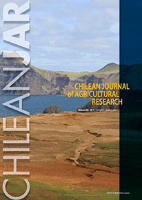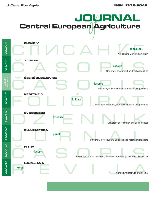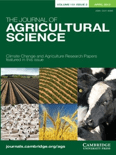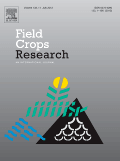
AgriEngineering
Scope & Guideline
Empowering Research for Enhanced Food Production Systems
Introduction
Aims and Scopes
- Precision Agriculture Technologies:
Research dedicated to the development and application of technologies such as remote sensing, machine learning, and IoT for improving agricultural productivity and sustainability. - Sustainable Agricultural Practices:
Exploration of methods and technologies aimed at enhancing sustainability in agriculture, including waste management, resource conservation, and eco-friendly farming techniques. - Automation and Robotics in Agriculture:
Focus on the design, development, and implementation of robotic systems and automated machinery to improve efficiency in planting, harvesting, and monitoring agricultural operations. - Soil and Crop Management Innovations:
Investigation into new practices and technologies for soil management, crop monitoring, and yield optimization, utilizing data-driven approaches and advanced modeling techniques. - Integrated Pest Management (IPM) Strategies:
Research on innovative pest control methods, integrating biological, chemical, and physical tools to minimize agricultural losses while promoting environmental health.
Trending and Emerging
- Machine Learning and AI Applications:
There is a significant increase in research utilizing machine learning and artificial intelligence for predictive analytics, crop monitoring, and decision-making processes in agriculture. - Remote Sensing and UAV Technology:
The use of drones and satellite imagery for precision agriculture is rapidly growing, facilitating real-time monitoring of crop health and soil conditions. - Sustainable Resource Management:
Emerging studies focus on sustainable practices for water and nutrient management, emphasizing efficiency and environmental conservation. - Agricultural IoT Solutions:
The integration of Internet of Things (IoT) technologies in agriculture is gaining traction, enabling real-time data collection and smart farming practices. - Biotechnology in Crop Improvement:
There is an increasing interest in biotechnological approaches for improving crop resilience and productivity, including genetic modifications and bioengineering techniques.
Declining or Waning
- Traditional Crop Management Techniques:
There is a noticeable decline in research focused on conventional agricultural practices, as the journal increasingly emphasizes precision and technology-driven approaches. - Chemical-Based Pest Control Methods:
Research on conventional chemical pesticides is waning, with a shift towards integrated and sustainable pest management strategies that focus on environmental safety. - Basic Agricultural Machinery Design:
While machinery design remains relevant, there is a reduced emphasis on basic designs in favor of advanced systems that incorporate automation and IoT functionalities. - Soil Fertility Management via Conventional Fertilizers:
Research on traditional fertilizer application methods is decreasing, with a growing interest in organic and precision fertilization methods that utilize data analytics. - General Agricultural Reviews:
The journal has moved away from broad reviews of agricultural practices towards more specialized studies that provide in-depth insights into specific technologies or methodologies.
Similar Journals

Engenharia Agricola
Cultivating insights for a greener tomorrow.Engenharia Agricola, published by the SOC BRASIL ENGENHARIA AGRICOLA, is a crucial open-access journal that has been at the forefront of agricultural engineering research since its inception in 1981. With an E-ISSN of 1809-4430 and an ISSN of 0100-6916, this journal stands out in the field by providing a platform for disseminating innovative studies and advancements in agricultural practices and technologies. Based in Brazil, the journal emphasizes global perspectives in agricultural and biological sciences, currently positioned in the Q3 quartile of its category, as recognized in the 2023 Scopus Ranks, where it ranks 97 out of 193 publications. Researchers, professionals, and students can access a plethora of high-quality articles that contribute to sustainable agronomy, agricultural mechanics, and resource efficiency across various environments, with open access since 2004, ensuring that critical knowledge is readily available to all stakeholders in the field.

APPLIED ENGINEERING IN AGRICULTURE
Driving Agricultural Innovation with High-Quality Research.APPLIED ENGINEERING IN AGRICULTURE is a peer-reviewed journal published by the American Society of Agricultural and Biological Engineers, dedicated to advancing the field of agricultural engineering through the dissemination of high-quality research. With an ISSN of 0883-8542 and an e-ISSN of 1943-7838, this journal has been a key resource since its inception in 1985, serving as a vital platform for scholars and practitioners to share innovative ideas and practical solutions that enhance productivity and sustainability in agricultural practices. The journal is ranked in the Q3 category for Engineering (miscellaneous) as of 2023, and is positioned within the 43rd percentile of the general engineering rankings in Scopus. While not currently an open-access journal, APPLIED ENGINEERING IN AGRICULTURE remains crucial for researchers and professionals looking to explore diverse engineering solutions that address the complexities of modern agriculture, making it an invaluable resource for anyone committed to improving agricultural systems through engineering advancements.

Advances in Agriculture
Driving Change in Agriculture, One Study at a TimeAdvances in Agriculture is a prominent Open Access journal dedicated to the dissemination of high-quality research in the fields of agriculture, agronomy, animal science, food science, and soil science. Published by HINDAWI LTD from the United Kingdom, this journal has made significant strides since its inception in 2014, contributing to the advancement of agricultural knowledge and practices. With an impressive impact factor reflected in its tiered quartile rankings, notably Q2 in Agricultural and Biological Sciences (miscellaneous), Agronomy and Crop Science, and Animal Science and Zoology, it serves as a key platform for innovative research and applied science. The journal aims to provide researchers, professionals, and students with rich access to groundbreaking studies that can help shape sustainable agricultural practices and policies. Emphasizing a global audience, Advances in Agriculture promotes an inclusive dialogue among scholars to tackle contemporary challenges in agriculture, enhancing food security and environmental stewardship worldwide.

Chilean Journal of Agricultural Research
Cultivating knowledge for food security and sustainability.Chilean Journal of Agricultural Research, published by INST INVESTIGACIONES AGROPECUARIAS - INIA, is a premier academic journal dedicated to the advancement of knowledge in the fields of Agronomy, Crop Science, Animal Science, and Zoology. With an ISSN of 0718-5839, this journal serves as a vital resource for researchers, professionals, and students alike, facilitating the dissemination of impactful research from Chile and around the globe. Classified as a Q2 journal in both Agronomy and Crop Science and Animal Science and Zoology as of 2023, it occupies a significant position in academic rankings, highlighted by its Scopus metrics, which recognize its contributions to the field. The journal operates under an Open Access model, ensuring that valuable research is accessible to a wider audience, thereby promoting innovation and collaboration. With a converged publication timeline from 2008 to 2024, the Chilean Journal of Agricultural Research continues to enhance understanding and foster advancements in agricultural science, thus playing an instrumental role in addressing contemporary challenges in food security and sustainable practices.

Journal of Central European Agriculture
Sharing Critical Research for a Thriving Agricultural CommunityThe Journal of Central European Agriculture, with ISSN 1332-9049 and E-ISSN 1332-9049, is an esteemed platform published by UNIV ZAGREB, FAC AGRICULTURE that caters to the dynamic fields of agronomy, crop science, and animal science. Since its establishment in 2000, this Open Access journal has played a crucial role in disseminating critical research findings while fostering collaboration among academics, researchers, and professionals within the agricultural community. The journal, which is based in the heart of Croatia, spans a rich history of scholarship, with its content available for free to readers and contributors alike. As reflected in its current standings, the journal has achieved a Quartile 3 ranking in Agronomy and Crop Science and Quartile 4 in Animal Science and Zoology for the year 2023, indicating its growing influence within these disciplines. With Scopus ranks placing it in the 32nd percentile among its peers, the Journal of Central European Agriculture is committed to advancing agricultural sciences not only in Central Europe but globally as it prepares for its converged years from 2007 through 2024. This journal serves as a vital resource for innovative research, practical applications, and a deeper understanding of agricultural challenges and solutions.

Revista Ciencia Agronomica
Connecting research and practice in agricultural sciences.Revista Ciencia Agronomica is a leading open access journal published by the Universidade Federal do Ceará, Departamento de Geociências, dedicated to advancing the field of agricultural sciences. Established in 2008, the journal has emerged as a significant platform for the dissemination of original research and innovative advancements in areas including agronomy, horticulture, and soil science, with a dedicated convergence of years extending to 2025. With an impactful presence in academic circles—ranking in Q3 for Agronomy and Crop Science and Soil Science and Q2 for Horticulture in 2023—this journal provides vital insights for researchers and practitioners alike. Although specific HIndex metrics are currently unavailable, the journal's Scopus rankings attest to its relevance, placing it in the 52nd, 44th, and 43rd percentiles across multiple pertinent categories. Since transitioning to an open access model in 2010, Revista Ciencia Agronomica has committed to maximizing the reach and impact of its published work, thereby ensuring valuable contributions to global agricultural knowledge.

Agrosystems Geosciences & Environment
Unlocking insights for optimal soil and crop management.Agrosystems Geosciences & Environment, published by WILEY, is a premier open access journal dedicated to advancing the interdisciplinary field of agricultural and environmental sciences. With an E-ISSN of 2639-6696, the journal has gained recognition since its inception in 2018, currently holding a Q2 ranking in Agricultural and Biological Sciences, Plant Science, and Soil Science. Operating from the United Kingdom, Agrosystems Geosciences & Environment contributes significantly to knowledge generation and dissemination, offering vital insights into sustainable practices, soil management, and crop optimization. Researchers and professionals will find the open access model particularly advantageous, promoting greater visibility and engagement within the scientific community. By bridging the gap between geosciences and agrosystem management, this journal is vital for those committed to addressing today's critical environmental challenges.

PESQUISA AGROPECUARIA BRASILEIRA
Driving sustainability through cutting-edge agricultural studies.PESQUISA AGROPECUARIA BRASILEIRA, an esteemed journal published by EMPRESA BRASIL PESQ AGROPEC, serves as a vital platform for disseminating research in the realms of agronomy, animal science, horticulture, and soil science. With an ISSN of 0100-204X and an e-ISSN of 1678-3921, this Open Access journal has been at the forefront of agricultural research since its initiation in 1978, and has been fully accessible to researchers globally since 1999. Hailing from Brazil, it is dedicated to advancing knowledge in agricultural practices and sustainability, making it an essential resource for academics and professionals alike. The journal is ranked in the Q3 and Q4 quartiles across various categories, reflecting its impact within the scientific community, while its Scopus rankings illustrate its commitment to high-quality scholarship. With its rigorous peer-review process, PESQUISA AGROPECUARIA BRASILEIRA not only promotes scholarly engagement but also plays a crucial role in addressing agricultural challenges, thus appealing to a broad audience of researchers, professionals, and students seeking to contribute to this dynamic field.

JOURNAL OF AGRICULTURAL SCIENCE
Transforming Agriculture with Cutting-Edge ResearchJOURNAL OF AGRICULTURAL SCIENCE, published by Cambridge University Press, stands as a pivotal resource in the field of agricultural research. With a rich history dating back to 1905, this esteemed journal has consistently delivered cutting-edge scholarly articles that address pressing issues in agronomy, crop science, animal science, and genetics. Currently holding a Q2 ranking in Agronomy and Crop Science and Animal Science and Zoology, and a Q3 in Genetics, it reflects a robust impact within the academic community, contributing to innovative practices and technologies in agriculture. Indexed in Scopus, its authors benefit from broad visibility, supported by a strong readership among researchers, professionals, and students alike. While the journal does not currently offer open access, its rigorous peer-review process ensures that published works meet the highest scholarly standards, fostering a rich environment for knowledge exchange and advancement in agricultural science.

FIELD CROPS RESEARCH
Pioneering Discoveries in Agronomy and Soil ScienceFIELD CROPS RESEARCH is a premier academic journal published by Elsevier, dedicated to advancing knowledge in the fields of Agronomy and Crop Science as well as Soil Science. Now in its 46th year of publication, this esteemed journal has established itself as a leading resource, holding a prestigious Q1 ranking in both the Agronomy and Soil Science categories, with a remarkable blend of rigorous peer-reviewed research and innovative findings. With a Scopus ranking of #27/406 in Agronomy and #20/159 in Soil Science, and a notable 93rd and 87th percentile respectively, FIELD CROPS RESEARCH plays a vital role in informing practices that drive sustainable agriculture and optimize crop production. Although not an open access journal, it remains highly accessible to the global research community and offers critical insights that influence policy and agricultural practices worldwide. Researchers, professionals, and students are encouraged to delve into this journal, as it continues to shape the future of field crop research through impactful studies and comprehensive reviews.